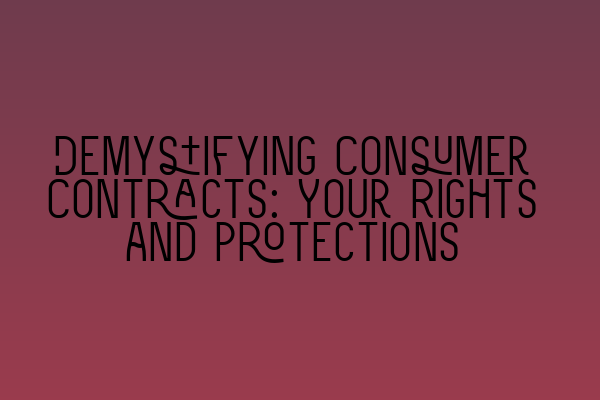Demystifying Consumer Contracts: Your Rights and Protections
Consumer contracts are a fundamental part of our daily lives, governing the purchases we make and the services we acquire. However, many individuals are unaware of the rights and protections they are entitled to under these contracts. This blog post aims to demystify consumer contracts, shedding light on the essential elements and providing you with the knowledge to navigate them confidently.
Understanding Consumer Contracts
A consumer contract is a legally binding agreement between a consumer and a business, outlining the terms and conditions of a purchase or service. These contracts can take various forms, such as online agreements, written contracts, or verbal agreements.
It’s important to note that consumer contracts are designed to protect consumers and ensure fair and transparent transactions. They set out the rights and responsibilities of both parties involved, ensuring you have recourse in case of any issues or disputes.
Your Rights as a Consumer
As a consumer, you have several rights that are protected under consumer law. These rights serve as a safety net, ensuring that you are not taken advantage of by unscrupulous businesses. Here are some key rights you should be aware of:
- The right to accurate information: Businesses must provide clear and accurate information about their products or services, including any terms and conditions, prices, and delivery details. False or misleading information is a breach of your rights.
- The right to a cooling-off period: In certain circumstances, you have the right to cancel a contract within a specific period and receive a full refund. This is especially applicable for distance purchases, such as online shopping or doorstep sales. Make sure to check the terms and conditions to understand the cooling-off period.
- The right to refunds and repairs: If a product is faulty or does not meet the specified standards, you have the right to a repair, replacement, or refund. This right applies to both goods and services, providing you with adequate protection and recourse in case of dissatisfaction.
- The right to privacy and data protection: With the rise of online transactions, the protection of personal data is crucial. As a consumer, you have the right to privacy and to control how your personal information is used by businesses. Make sure to review privacy policies and understand your consent rights when sharing personal information.
These are just a few examples of the rights afforded to consumers under consumer contracts. Familiarizing yourself with these rights will empower you to make informed decisions and take action if any issues arise.
Enforcing Your Rights
Knowing your rights is only the first step. To enforce your rights under consumer contracts, you need to be proactive. Here’s what you can do:
- Keep records: Maintain a record of all communication, contracts, receipts, and warranties relating to your purchases. These documents can serve as evidence if a dispute arises.
- Communicate with the business: If you encounter any issues, reach out to the business to resolve the matter. Clearly communicate your concerns and expectations. Many disputes can be resolved through open and respectful dialogue.
- Seek professional advice: If the issue remains unresolved, consider seeking legal advice from a solicitor or consumer rights organization. They can provide guidance and assist you in navigating the legal process.
- File a complaint: In some cases, you may need to file a formal complaint with the relevant consumer protection agency. This step can initiate an investigation and potentially result in a resolution.
Remember, being proactive and assertive about your rights is crucial to ensuring fair treatment as a consumer.
Staying Informed
Consumer law is constantly evolving, and it’s essential to stay informed about any changes or updates. By keeping up to date with the latest regulations, you can better protect yourself and make informed decisions.
Additionally, if you’re studying contract law or preparing for the SQE (Solicitors Qualifying Examination), be sure to check out the following related articles:
- SQE 1 Practice Exam Questions
- SQE 1 Practice Mocks FLK1 FLK2
- SQE 2 Preparation Courses
- SQE 1 Preparation Courses
- SRA SQE Exam Dates
These articles will provide you with invaluable resources and help you prepare for your exams.
Conclusion
Consumer contracts play a significant role in our daily lives, and understanding your rights and protections as a consumer is essential. By familiarizing yourself with consumer laws, staying informed, and proactively asserting your rights, you can navigate these contracts confidently and ensure fair treatment in your transactions.
